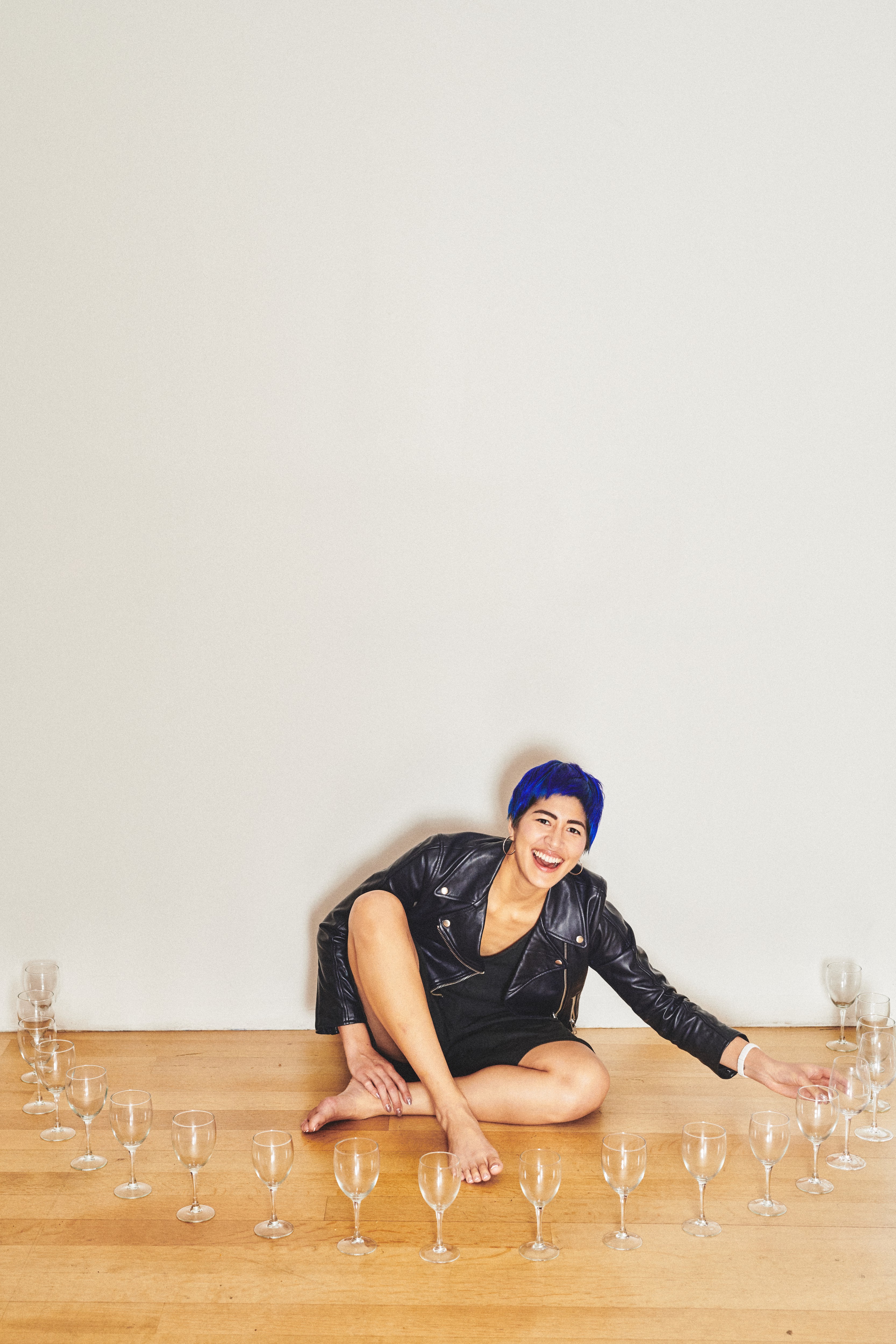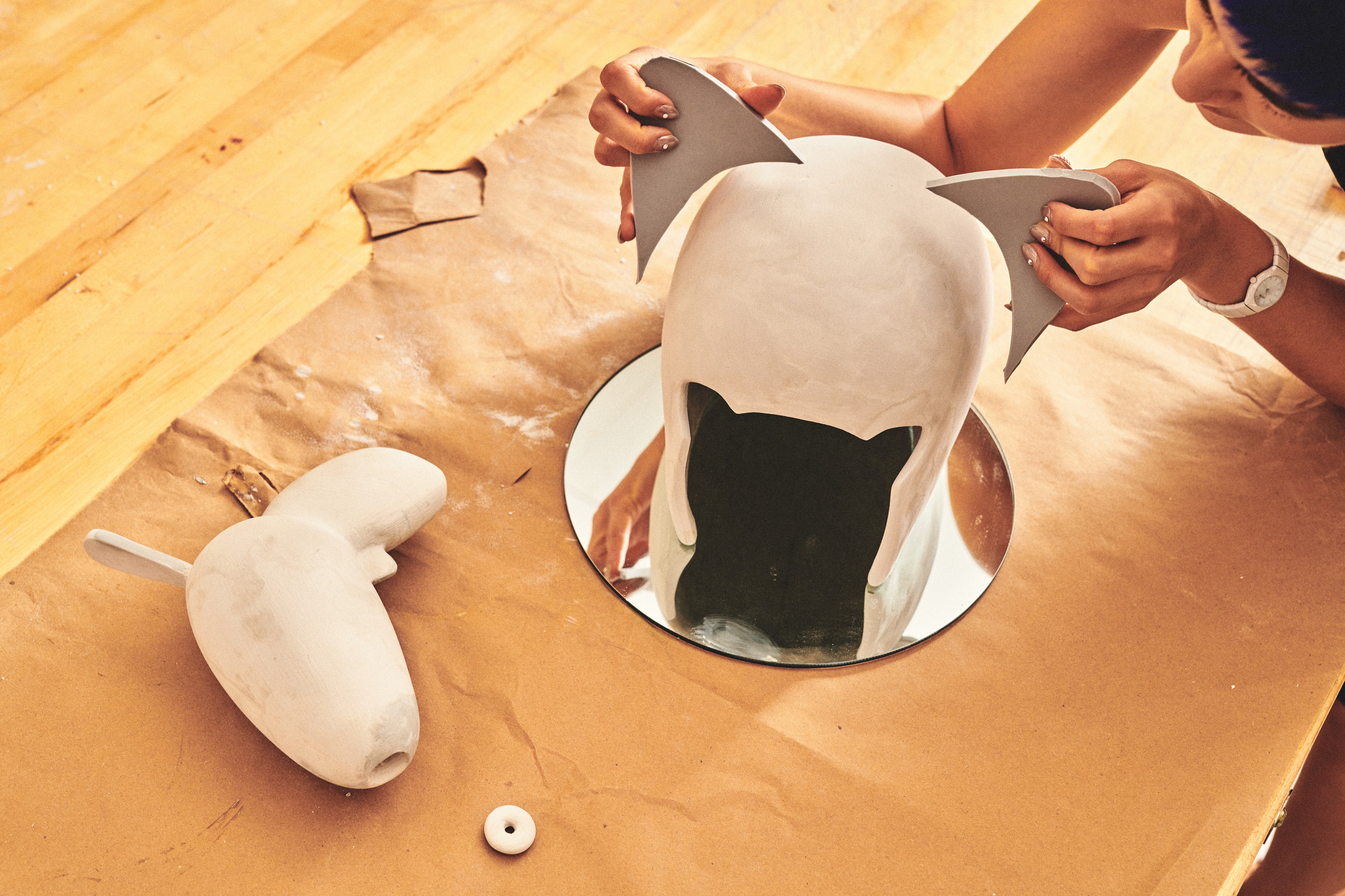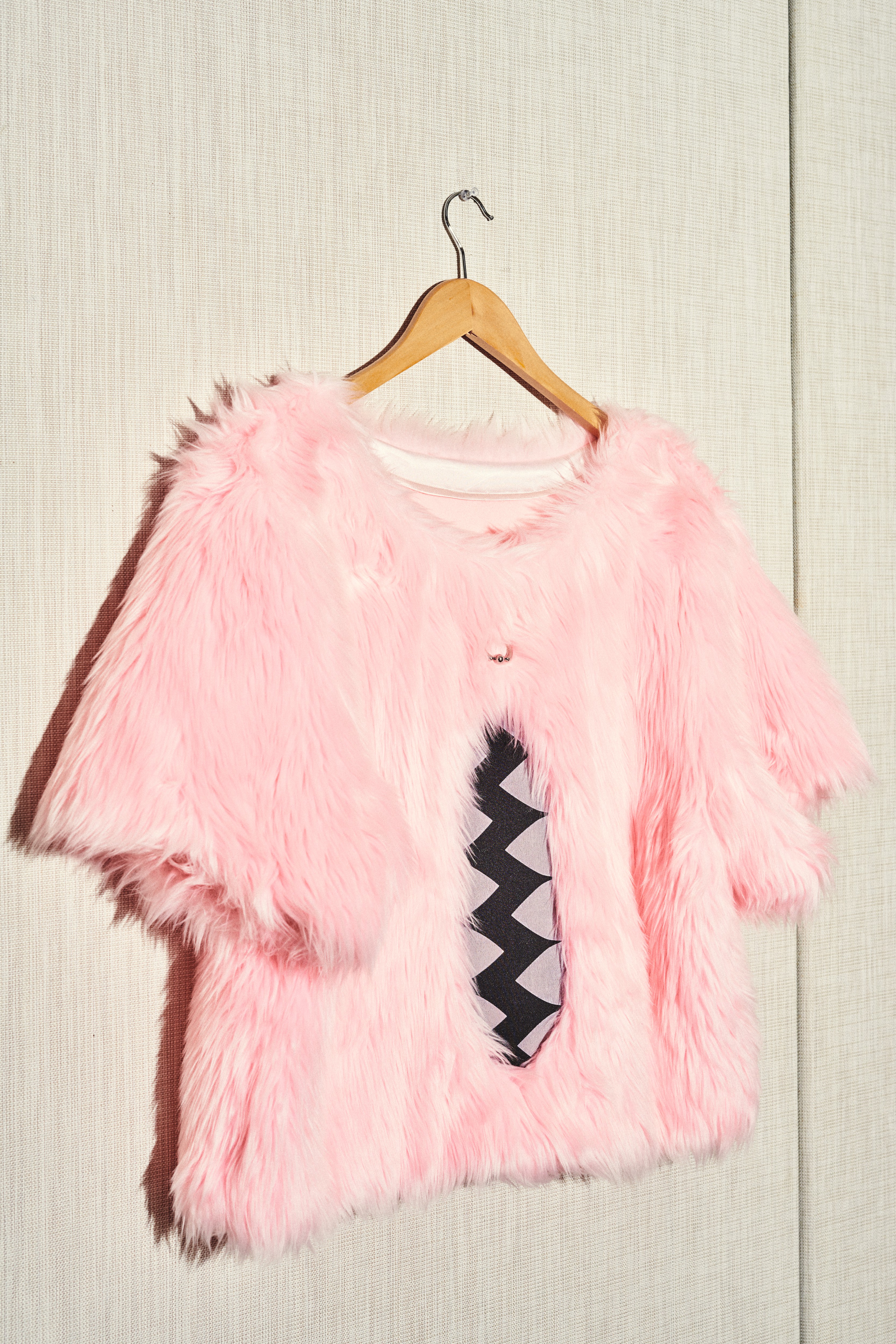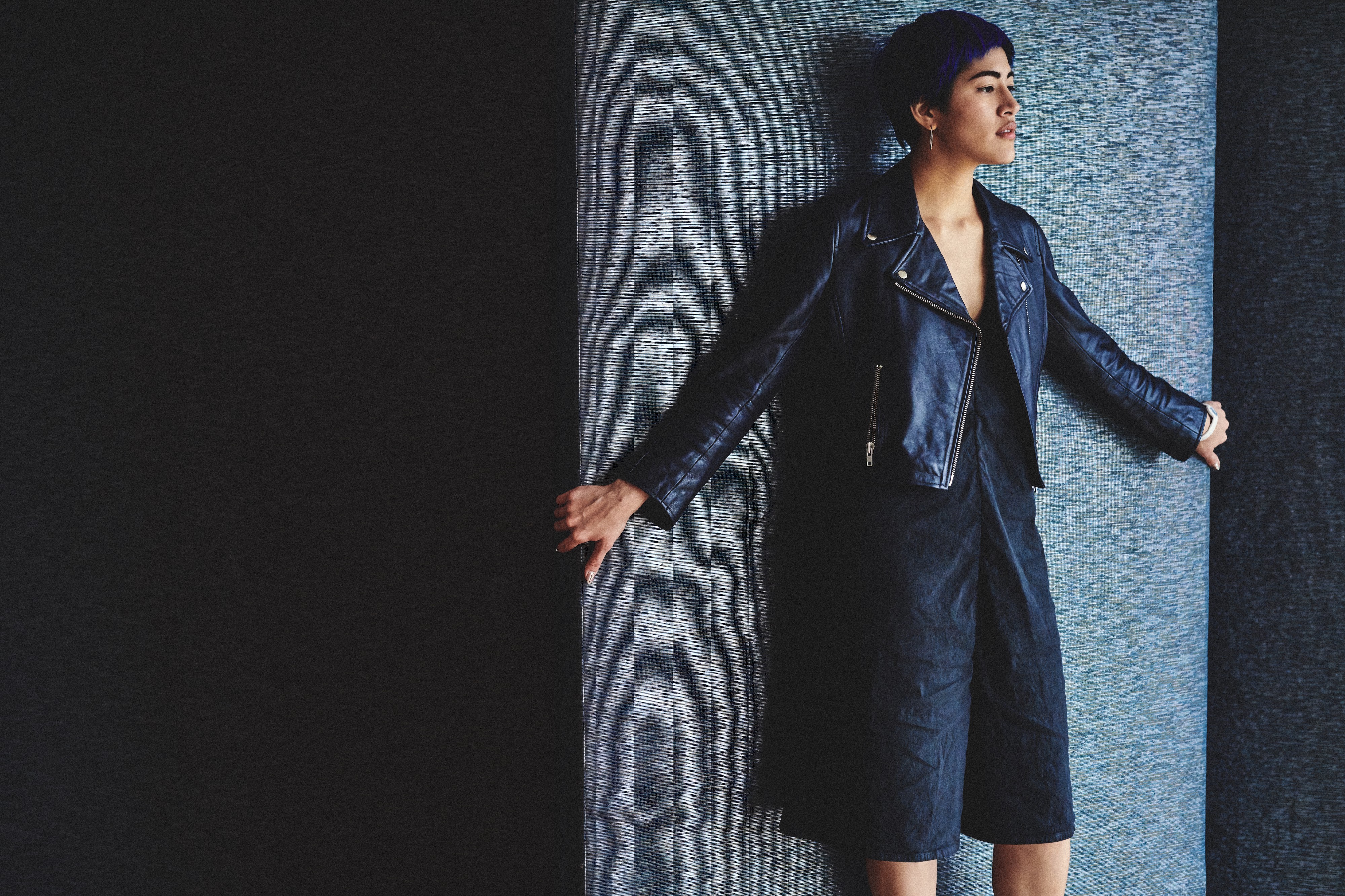Power Trip
Emma Sulkowicz wants to see #MeToo move beyond testimonies, and towards making amends
 All photos: Bryan Derballa
All photos: Bryan Derballa

While other artists might arrive at a project with a concept and message fully formed, Sulkowicz begins with an image, one that pops into their head and stays there until they begin to craft it into a physical object, and through that process, understand its meaning.
For Mattress Performance (Carry That Weight), Sulkowicz spent weeks haunted by the simple image that would later become an iconic representation of anti-sexual assault activism: themself, on campus, carrying a mattress. It was only as they began to transform that mental image into a physical experience, mapping out the rules that would guide their months of performance art, that they began to understand what they wanted to say.
To many onlookers, including much of the media, Sulkowicz?s message was readily apparent: a bold testimony to the experience of assault survivors and the burden they?re forced to carry, a demand for justice and amends. But the piece was also intended as something more complex than a manifestation of trauma.
?Their work is about what happens when testimonies fail,? says Aliza Shvarts, an artist and teaching fellow at the Whitney Museum who became friends, and occasional collaborators, with Sulkowicz. What?s often forgotten in the debate over Mattress Performance (Carry That Weight) is that Sulkowicz did not take public action against their alleged assailant until after discovering that multiple other people had had damaging experiences with him. It was only after both the university sexual assault reporting process and New York Police Department failed to yield any meaningful resolution that Sulkowicz turned to art ? and even then, their initial gambit was far less accusatory than has been reported in the press. (?He identified that it was about him. He raised his hand by suing the university,? they tell me.)
And Mattress Performance (Carry That Weight) was never just about Sulkowicz as an individual survivor, but rather their place within the Columbia community ? a community that could gawk at Sulkowicz, look away from them and ignore their pain, or choose to support Sulkowicz by helping carry the mattress. ?To me it was more about [shared burden] than the actual rape itself,? they say.
Sulkowicz?s The Floating World, a collection of sculptures that debuted at The Invisible Dog Art Center this past spring, comes back to the theme of community, offering a tribute to the friends, family, and loved ones who?ve supported Sulkowicz throughout their recovery from trauma. Each member of Sulkowicz?s support team is represented by a transparent orb containing a collection of objects Sulkowicz associates with that person; each orb is suspended from the ceiling by shibari rope, a material used in a method of bondage and suspension which, Sulkowicz explains, simultaneously inflicts pain while creating an unparalleled sensation of support.
It is, they say, a metaphor for the relationships we have with the people we love. ?Especially when you?re feeling the most pain, the people you love are there to lift you back up, support you, hold you together.? And when you?re coming forward about sexual assault, a supportive community can make all the difference between being affirmed and being denied; between having your testimony acknowledged and acted upon and having it wholly dismissed.
Back at the studio, Sulkowicz gestures to a sketch that?s tacked up on their wall, pulling it down to give me a closer look. It?s a drawing of round, chunky gun; like a raygun out of a sci-fi flick, or a water gun you might find at Toys ?R Us. This gun, Sulkowicz tells me, is an image that?s been in their head for weeks, and as they started committing it to paper, it became clear it was the beginning of a brand new work.



Sulkowicz?s latest artwork turns inward to examine the ways survivors protect themselves. The work is still in its early stages, a collection of partially completed sculptural objects and sketches. But in its final form, the project will be a collection of weaponry and armor, a take on the empty suits of armor at the Metropolitan Museum of Art ? although one, Sulkowicz tells me, that?ll be decidedly femme and ?kawaii,? a Japanese term that roughly translates to cute. Sulkowicz envisions a helmet encrusted with pink rhinestones and beads and topped with furry pink ears, a protective outfit for a being Sulkowicz describes as a ?Hello Kitty warrior;? a cartoonishly bulbous pink gun; a spike-covered guard dog inspired by the kappa, a water demon found in Japanese mythology, will be a ?kawaii kappa.?
It?s all a fantasy of what it might look like to have better protection from assault, but also from the unwanted attention Sulkowicz?s celebrity has garnered. Even in its unfinished form, the project is already serving this purpose: within their studio, the guard dog functions as something of a traffic cone, creating a barrier between Sulkowicz and studio visitors who might attempt to get too close.
It?s also a celebration of the protection Sulkowicz already has access to, including promiscuity (the gun, Sulkowicz is quick to note, is rather phallic), introversion, and anger. ?I think people are so afraid of femme defenses,? Sulkowicz tells me. ?As soon as a femme or survivor or whatever acts a certain way because it?s a necessary defense for them, people are like, ?Wow, what a bitch.?? They gesture towards the dog in the corner of the studio with a giggle. ?That?s even why I?m making a bitch.? Sulkowicz hopes to push people ?out of the frame of mind where we are applauding Christine Blasey Ford for being a perfect victim and not crying while she gives her testimony. We could celebrate whatever her mode of coping with what happened to her is, and be like, ?You are behaving properly however you choose to be.??
The gun that appears in their armory? ?Even though I?m feeling upset and wishing I had a [gun], do I really want to perpetuate more anger and violence?? Sulkowicz muses. Years of seeking justice for their trauma through a system designed to punish offenders has left them disenchanted with the idea that punitive measures actually benefit survivors. If anything, a system that offers extreme punishment with no opportunity for rehabilitation can punish victims all the more, forcing them to retraumatize themselves as they attempt to offer ?proof? that their abuser deserves to be branded as a rapist for life.
Since we have a culture where people are, ?Once a rapist, always a rapist,? they?re never going to feel okay with admitting they?ve done anything.
Sulkowicz has changed a great deal in the years since Mattress Performance (Carry That Weight). In 2014, they didn?t identify as a feminist, or even fully understand what feminism was; now they?re treated as a leading voice among young feminists. And they?ve gone from being a college art major to a respected figure in the art world, one who?s earned praise from big names like Marina Abramovic and given talks all around the country and on the other side of the world.

But Sulkowicz is still wrestling with what should happen in the wake of a sexual assault. Sulkowicz wants to see a world that prioritizes the needs of survivors over the destruction of offenders. A world that, first and foremost, believes survivors, offers them support, respects their healing process, and does not shame them. A world that meets the anger and hurt of being violated with compassion and extends that compassion to abusers, offering those who own up to their actions a path to redemption through apologies and amends rather than punishment alone.
?But instead, since we have a culture where people are, ?Once a rapist, always a rapist,? they?re never going to feel okay with admitting that they?ve done anything and then, like Brett Kavanaugh, they will defend their name tooth and nail and cry and scream and stomp their feet, and anything they can do to make sure they don?t have the rapist tag,? Sulkowicz says. They pause for a second, thinking what form this alternate world might take. ?I would love it if Brett Kavanaugh could just be like, ?Oh my gosh, I was blindingly drunk that night, and I?m so sorry I did this thing that may have seemed okay to me at the time but is clearly not to you or to anyone today. And thank you for educating me and thank you for showing me my errors.? I would love that.?
It?s a nuanced perspective on how to handle abuse and abusers that makes space for the complicated emotions and experiences of survivors while allowing abusers to repair the damage they?ve done and be forgiven, rather than be marked forever, so long as they?re willing to take accountability and actively participate in the healing process. (Sulkowicz has little sympathy for abusers who don?t take accountability, however.)
During their appearance on Conversations With People Who Hate Me, Sulkowicz patiently explained to Benjamin why his standards for what constitutes a ?real? assault victim are unfair, outlining why survivors don?t come forward immediately, don?t report their assaults to the police, and may have complicated, seemingly amicable relationships with their assailants after the assault.
?What happens to the accused people if everyone who says they?re raped can?t give extremely strong evidence for the rape?? he asks, rehashing the concern that #MeToo risks devolving into a ?witch hunt.? In the wake of Brett Kavanaugh?s appointment to the Supreme Court, it?s clear Benjamin is not alone in wondering this; that many people still worry more about the risks to men?s reputations than the safety and support of survivors, and that many of those people are firmly entrenched in power.
With time, Sulkowicz hopes we?ll be able to chip away at that stronghold, that more of us will embrace a nuanced and complicated understanding of how to respond to, heal from, and prevent sexual assault. But there?s a long way to go. Benjamin seemed receptive to all of Sulkowicz?s arguments throughout their conversation, as Sulkowicz pushed him to accept the reality of what happened to them, and continues to happen to so many others. But at the end of the episode, it?s clear he?s still not a believer.
Emma Sulkowicz?s artwork is currently on display at YES AND MORE NO, an exhibition featuring work about sexual abuse.


